You’d be hard-pressed to find a larger than life figure than Dr. John C. Hitt, the President of the University of Central Florida (UCF) who has awarded a quarter million degrees over the last 25+ years. Perennially on the short list of most influential people in the region, he is currently the Dean of Florida’s University Presidents and is on the cusp of retiring this week. He has secured a legacy at UCF that includes opening a competitive Honors College, a medical school, an on-campus football stadium, and has secured approvals to build a new downtown Orlando campus and a hospital in Lake Nona. Firmly at the helm, he transformed a commuter school into one of the nation’s largest universities.
He has been there for so long that he was already President for a few years when I started my first stint at UCF! More on that below.
Here is an infographic that illustrates the moon-shot trajectory that he has led UCF on:

In my capacity on the UCF Alumni Board, I’ve had interactions with Dr. Hitt, but this would be the first time I would have the chance to have a one-on-one conversation with him. Given the demand for his time, I was beyond elated when I was told he accepted my invitation for the interview. It was the day after Memorial Day when I drove to campus and pulled up outside Millican Hall at 4:15pm and jogged in through the rain …
[Setting: I was downstairs on the first floor of Millican Hall going over my notes for the interview when I snapped & posted this picture. Josh, my photographer, arrived and we went upstairs to meet Courtney, who is on the Communications Staff at UCF. She led us into Dr. Hitt’s office where I sat down with him at a large table …]
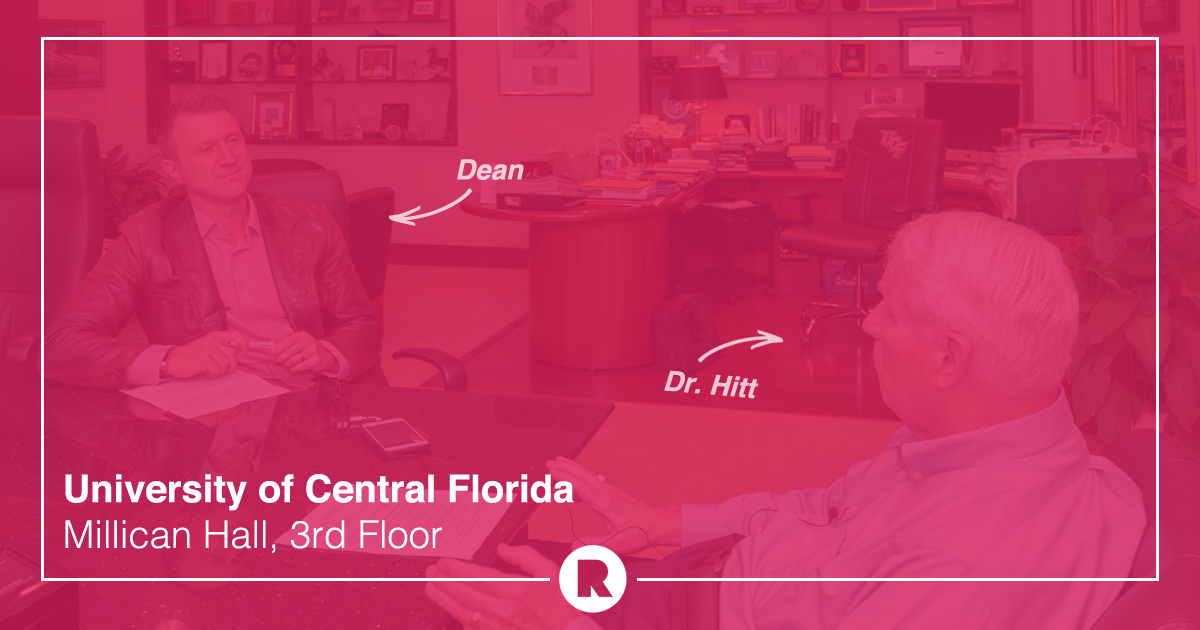
Dean: Dr. Hitt, thank you so much for doing this. I really appreciate you taking the time after the three day weekend to meet with me.
Dr. Hitt: I’m happy to do it, Dean.
Dean: My wife is 36 weeks pregnant now and we’re about to have our first child. We’re in the home stretch here and I wanted to ask, is there any advice you can share with me about fatherhood?
Dr. Hitt: Well, I’m probably not the greatest one to give advice about fatherhood, but I would just say don’t neglect to pay attention to the moment. If you’re having to stay up with a colicky kid for the night, it can seem like forever, but all of that is going to go by in a flash as you get older. My son now is 54 years old and I still think about things that went well and some that didn’t and if I had one regret, it would be I didn’t pay enough attention to the moment that I was in. I thought too much about things past or future.
Dean: Are there any thoughts or advice on how to stay present?
Dr. Hitt: Practice makes perfect. Keep at it.
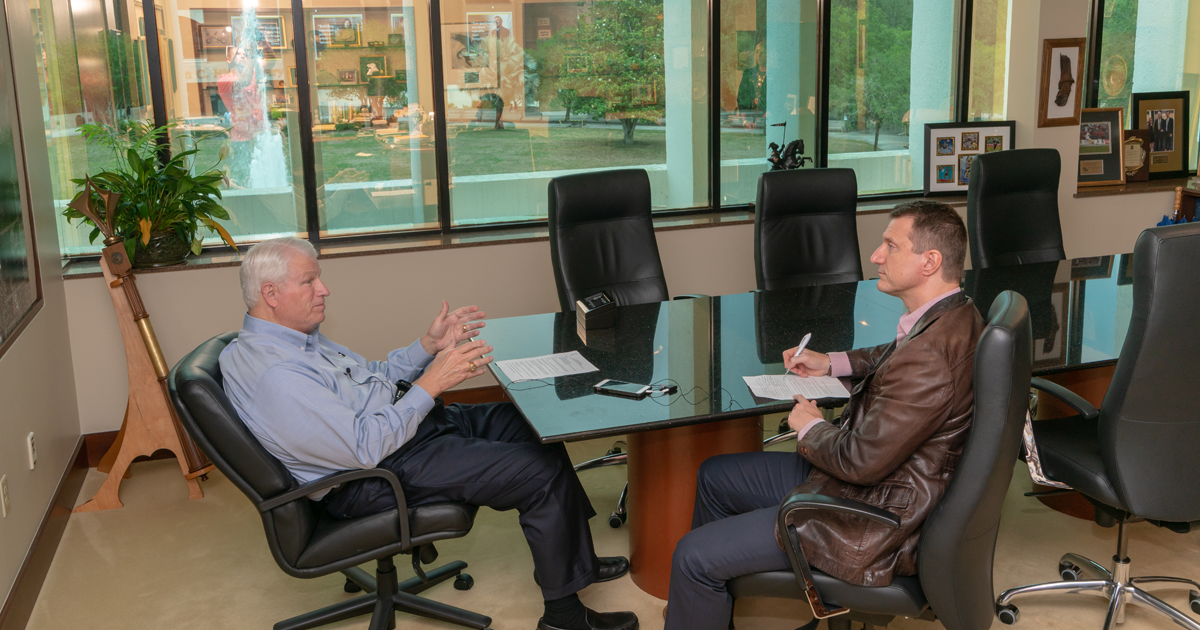
Dean: Is there a mentor that helped shape you early on in your career that helped with your trajectory?
Dr. Hitt: There were several. The one that stands out the most would be my major professor as an undergraduate. He was a fascinating guy. He was an immigrant from Germany and now this is back not too many years away from WWII. I went off to college for the first time in 1958 and I got into this guy’s class kind of by happenstance. I needed a class on Thursday morning to balance out my schedule and I heard that this new guy was a good lecturer so I thought well, let’s go take a look. Not many weeks went by and I was convinced that I wanted to be like him. He was a psychologist, I wanted to be a psychologist and I kind of went from there. He had some great values of good hard work, willingness to take a risk. It was a good model.
“You’ve got to learn that a wish is not a plan.”
Dean: It always amazes me how those kinds of random moments in life change your trajectory.
Dr. Hitt: Another guy I would mention is the fellow who gave me my first opportunity to do administrative work. A guy named Tom Brewer who was Vice Chancellor for Academic Affairs at Texas Christian University in Ft. Worth. He gave me a lot of little pushes and shoves in the right direction. I remember one comment in particular that he made after we had done a not very good job on something and he said to several of us in a very stern tone, “You’ve got to learn that a wish is not a plan.” Various forms of that circulate in administrative circles, but it’s some good advice.
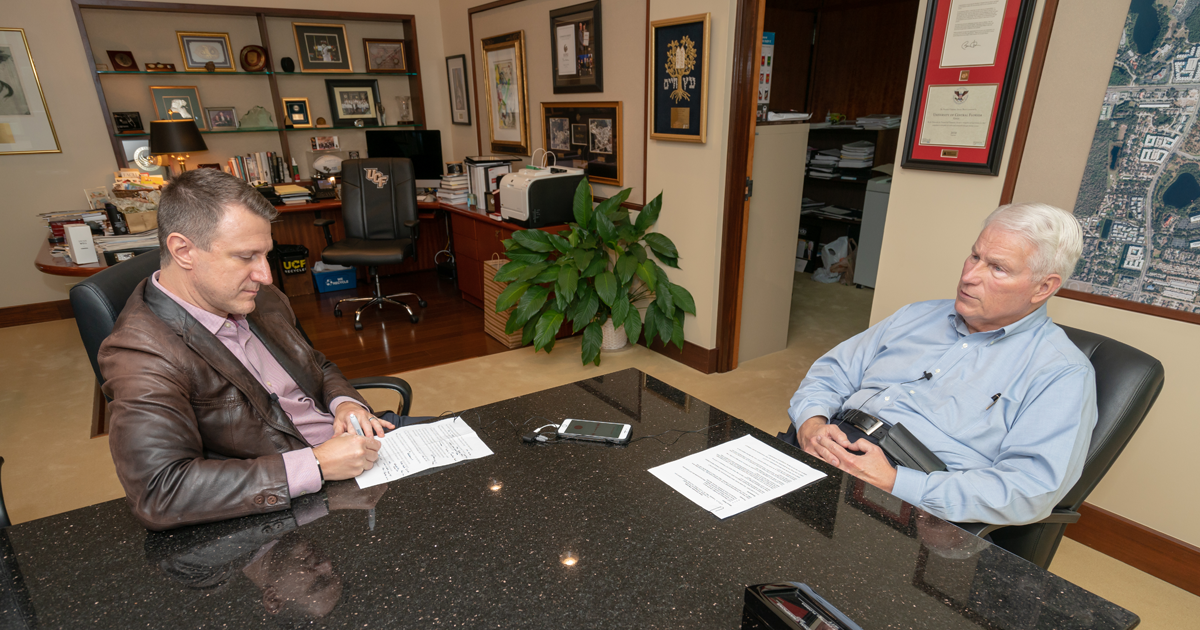
Dean: You mentioned the value of hard work. Would you say that with a mentor, it was somebody that showed you how they work and how they live or were there specific lessons that you pick up on?
Dr. Hitt: The fellow’s name was Bill Angermire and he was a very hard working individual and we modeled on him. If we were going to do something in the lab, a research project, he was there early and stayed late and didn’t just push the simple things off on the undergraduate volunteers. A very good guy to model after. He was a very bright guy, but he really valued hard work. You put the two together and it’s a pretty great combination.
Dean: Unstoppable combination, I would think. I mentor students at UCF and I always like to reminisce about things back in the day and you know, things in the mostly mid- to late-90s that I remember. One of them is that to get to the East-West Expressway, you had to go through a forest and I would just say keep going that way, you go through this forest… Is there a story from back in the 90s that kind of draws a stark contrast to East Orlando and the UCF area?
Dr: Hitt: You know the Memory Mall. Do you remember what it was before it became that?
Dean: A muddy parking lot? I remember that it was a parking lot. 
Dr. Hitt: Bill Merck, our Vice President for Administration and Finance, has the physical plan under his oversight and we were out talking about how we would site various buildings as things that had been there the longest. We had gotten to the point by the 90s where your big worry was not whether you put a building where it would be used, it was going to be used. The risk you had was that you would end up with two buildings in a space that could have easily held three with a little foresight. I can remember that we were out driving around the campus and looking and our thought was that we were making a transition to a major university. We looked out at Memory Mall and you had those posts sticking out this way and that and you could see the results of the last rainstorm in the ruts that were there. I can remember looking over at Bill and we were talking about what it meant to be a major university and I said Bill, I bet there aren’t any major universities that have big mud parking lots in the middle of their campus. He laughed and said I hear you. That kind of got us all thinking about how we would make that transition of usage for that very valuable space. Luckily, we provided for a Mall to be constructed there and if you look at it now, you would say well what would we do for campus character if we didn’t have something like the Memory Mall. We’ve got the Veterans Commemorative Site at one end and the whole complex, athletic and other facilities, at the northern end.
Dean: You mentioned land usage and the foresight of the future. Honestly, in the early 90s, did you envision UCF being the size it is today?
Dr. Hitt: No. I found a memo that reported a synopsis of a study on enrollment trends and it had forecasted that we would have 48,000 students. My first response was, “What?!” The biggest universities in the country were around 50,000. Then I started looking at where we were and what the trends projected for enrollment from new high school graduates and we actually met the forecast and a little more. There was an instance where we couldn’t have said that it was going to be 48,000 without that study, but you could look around and see how Orlando was growing and the whole state was growing. You knew if we did any kind of job at all really, we were going to grow. The question was to what size and to what the programs would be that we would support among our existing portfolio and what new things we needed to add. The most dramatic example there was a decision to pursue a medical college. When we did that, it made a lot of difference for how we were reviewed. You know, there were only about 150 medical colleges in the country and so to be able to build one put us in a different category of institutions really.
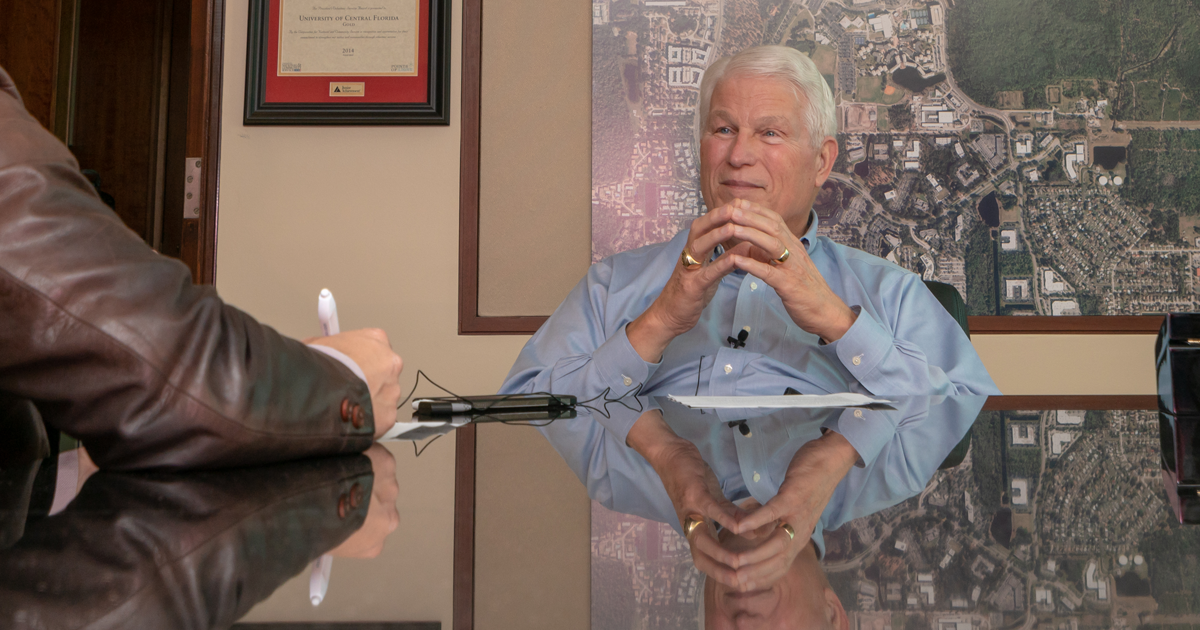
Dean: What would you say has been the biggest change in your day-to-day focus from 1992 to today? If you just take those two moments in time, how has it changed?
Dr. Hitt: The biggest change has been not just in the university’s size, but in its complexity. You’re dealing with a different institution that I was hired to be President of back in 1992. It’s been interesting over the years to watch those who flourish with that kind of change and unfortunately, to have to deal with some who don’t and really can’t keep up. You try to handle that as best you can with consideration for the individual, but not everyone can handle a lot of rapid change. If the success of the university depends on there being that kind of rapid change then people either have to get with it and be part of it or we have to find something else for them to do.
Some people think that they can kind of go off the record …
Dean: Would you say in 1992 your focus was more creating opportunities whereas today it’s more managing all of the opportunities that have emerged from the sheer size and influence of UCF?
Dr. Hitt: It was easier to see the things we needed to do in 1992. You could run a list of popular majors and I couldn’t call the numbers out for you right now, but we had areas that were obviously ready to explode if we just put the programs in. We didn’t have that many doctoral programs the first year that I was here. I think we probably conferred fewer than 20 Ph.Ds in the whole year and we had 147 at the commencement here just a few weeks ago.
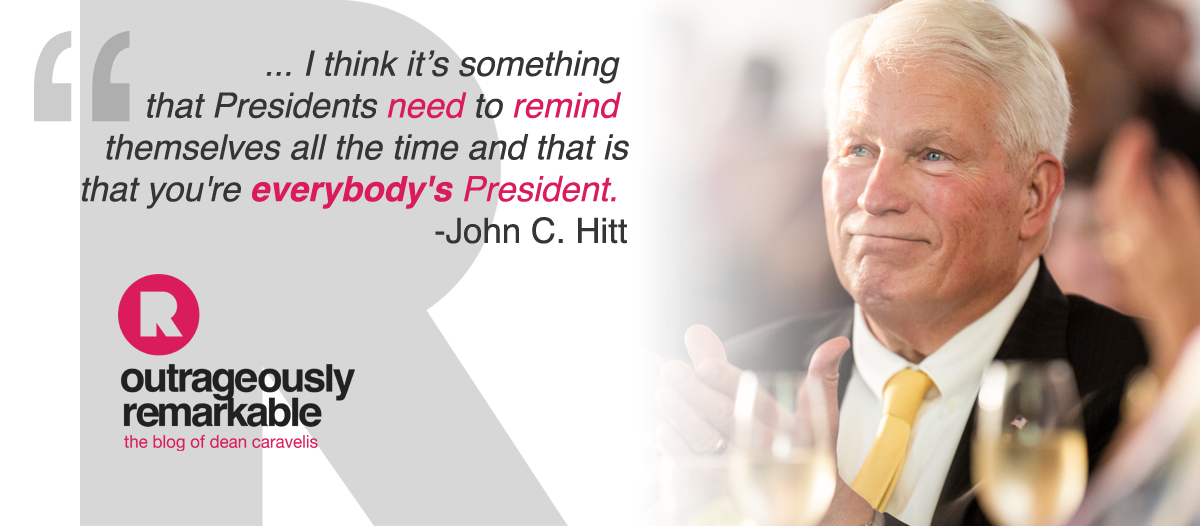
Dean: If you could email or send a message back to yourself on the first day that you became President of this University, just a short message, what would that message say?
Dr. Hitt: I find it hard to capture a phrase for it and it’s not something that I’m saying that I’m really lacking at, but I think it’s something that Presidents need to remind themselves all the time and that is that you’re everybody’s President. You can’t be just a part of the university’s President, the part that you like the most and give them all of your interest and time. You’ve got to think about the whole University and that you are always everybody’s President and that you’re never not the President. Some people think that they can kind of go off the record on something. Well, not really. You are always the President. I guess I’ll see the contrast on that in a few weeks when I step down as President, but even then I’ll be President Emeritus and I’m not sure what people’s expectations of me will be then, but they’ll be a lot less than today. It’s a good reminder.
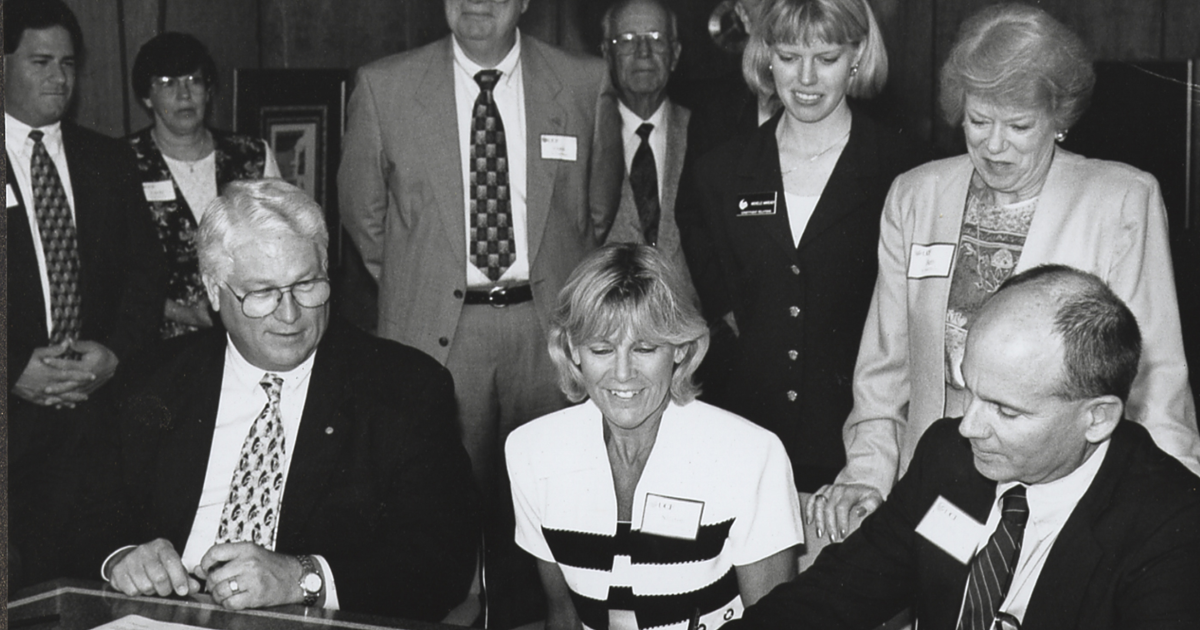
Dean: I think it’s a great leadership lesson for anybody who is in charge of running a large organization.
Dr. Hitt: You can’t just play the favorites no matter how good they are. The other thing is that you’ve got to have a sense of what is demanded of the University. If you have, for instance, a program that you must offer because it’s central to the purpose of that College or University, and it comes up short when you’re doing your big evaluation, you can’t say well we’re going to quit doing that because you’ve already said it’s essential that you do it. Then the argument is over how good is it. Is it good enough? Well if it’s not, you’re not going to suddenly say sorry, we’re not going to do it at all. So you’ve got to have that sense of what you do that helps motivate the changes that are needed to help bring it up to standard in a situation like that. You can’t just ignore, you’ve said it’s central to your success or to your purpose, so how do you balance all of that out? That’s something that some people never master and to others it comes naturally.
Dean: You mentioned getting up to standards and something that I hear a lot from entrepreneurs and CEOs is always how chasing perfect isn’t possible so very good within the time frame is good enough.
Dr. Hitt: Well, perfect is probably not attainable. I think it was Vince Lombardi who said if we chase perfection, we’ll catch excellence. I think there’s some truth in that. You do have to be realistic about what you hope to achieve, what’re the resources you’ve got, what’s the demand for the product, and you know all of that.
Dean: Behind every strong man is an even stronger woman. How has Martha helped you to successfully run UCF for this incredible stretch of time?
Dr. Hitt: I think one of the things that she brings to the role of First Lady is she’s a very beloved person and not just by me, but I think back to a few weeks ago when we had the going away reception for us and she was given an honorary degree. There aren’t many First Ladies who get honorary degrees. She’s a very genuinely nice person and she is exactly like what she’s been showing you she’s like. That’s Martha. She brings a lot of people to her to the University and of course, she’s been a wonderful wife for me for 56 years.
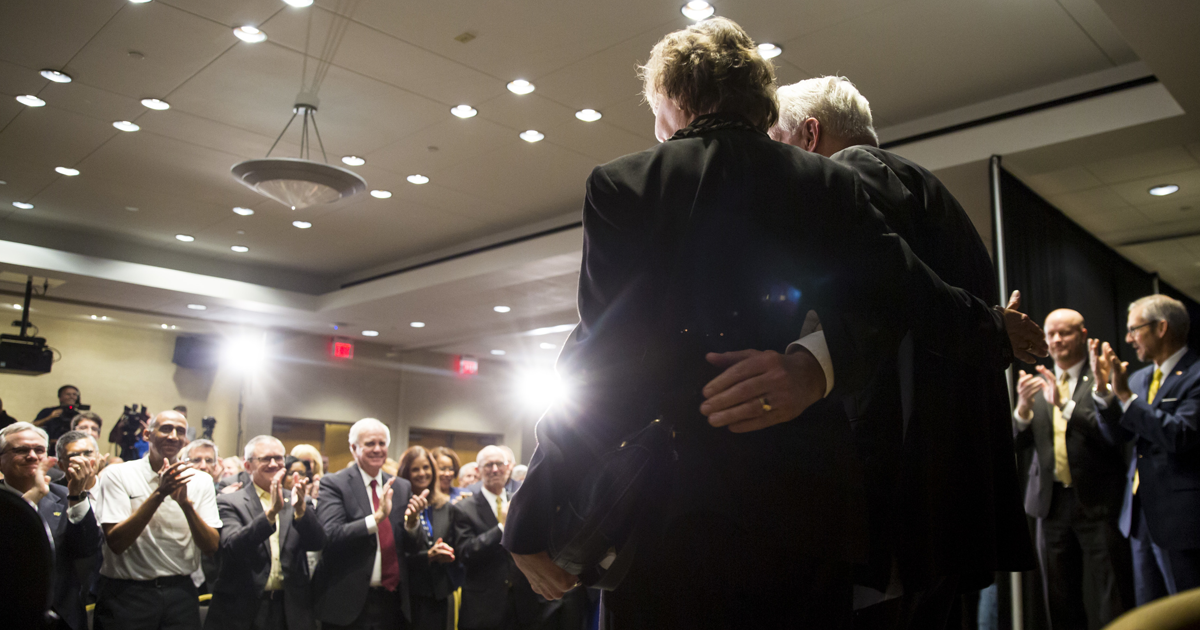
Dean: That’s awesome. So, I’ve had Imposter Syndrome for awhile because even though I’ve been given awards [and have had some success in my career], I was actually on probation at UCF [early on in my enrollment] and I came back to UCF through Direct Connect and made the most of the opportunity. I got an MBA and now I have a business. I’m mentioning it in this interview because I think that putting it on the record is how you face your fears. Even though those fears are probably unfounded, you know? Is there a favorite story that you have about redemption at your time at UCF?
I never like to be the center of attention, really.
Dr. Hitt: Not one that immediately comes to mind, but I’m a great believer in redemption and we need to have redemption and reconciliation play a much larger role in our society than they do today. The redemption stories I might think of might have too much in the details who the people wouldn’t necessarily want to be advertised. [laughs]
Dean: What is something that is absolutely true about you that most people on this campus wouldn’t believe?
Dr. Hitt: They probably wouldn’t believe how shy I am. I never like to be the center of attention, really. I was never the class clown or the most constructive kid in class and I look back and maybe it motivates me, but I know that I have to work to get myself out there.
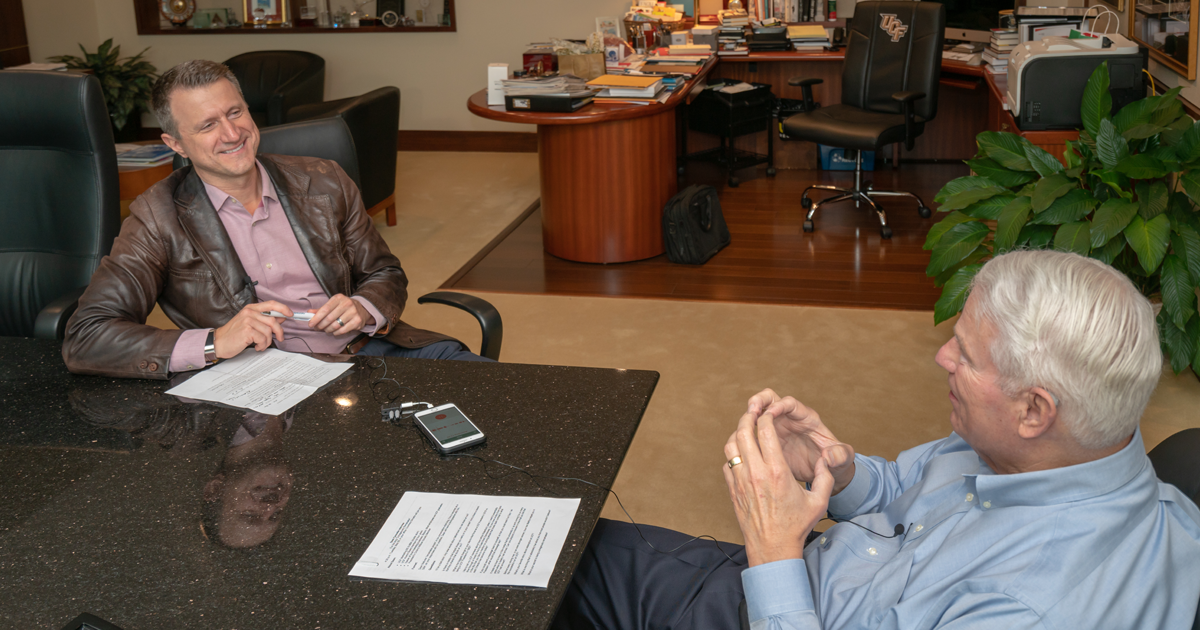
Dean: That’s interesting. So, if you’re actually shy, and I’m going to assume that you’ve been shy your whole life, how have you combated that? Is there anything that you’ve done specifically to be able to embrace being out of your comfort zone?
Dr. Hitt: When I was in high school, I got involved in the Speech Club and I was able to speak before hundreds, and occasionally thousands, of people in those contests and that helped.
Why wasn’t I scared?
Dean: You faced your fears, you went right at it. That’s the best way.
Dr. Hitt: Sometimes, yeah. I’m certainly not alone in that. Some folks I know pretty well here … we’ve got one very prominent alumnus who when he had to do a required speech for his speech class, he fainted on the first try, but he came back and got an A.
Dean: It just goes to show how doing is the best teacher.
Dr. Hitt: Well, and sometimes as you say you just have to face your fear and learning what you do to confront fear. Martha made a comment after a meeting years back, we hadn’t been here very long, that she didn’t know how I could make the comments that I had made that she’d be scared to death to do it. Why wasn’t I scared? I said what do you mean why wasn’t I scared? I was scared to death, but I had to say what I said because I had a responsibility to represent the University in that way. I think that a lot of it is that nobody said that you’re never going to be scared, but what you do when you are scared matters a lot.
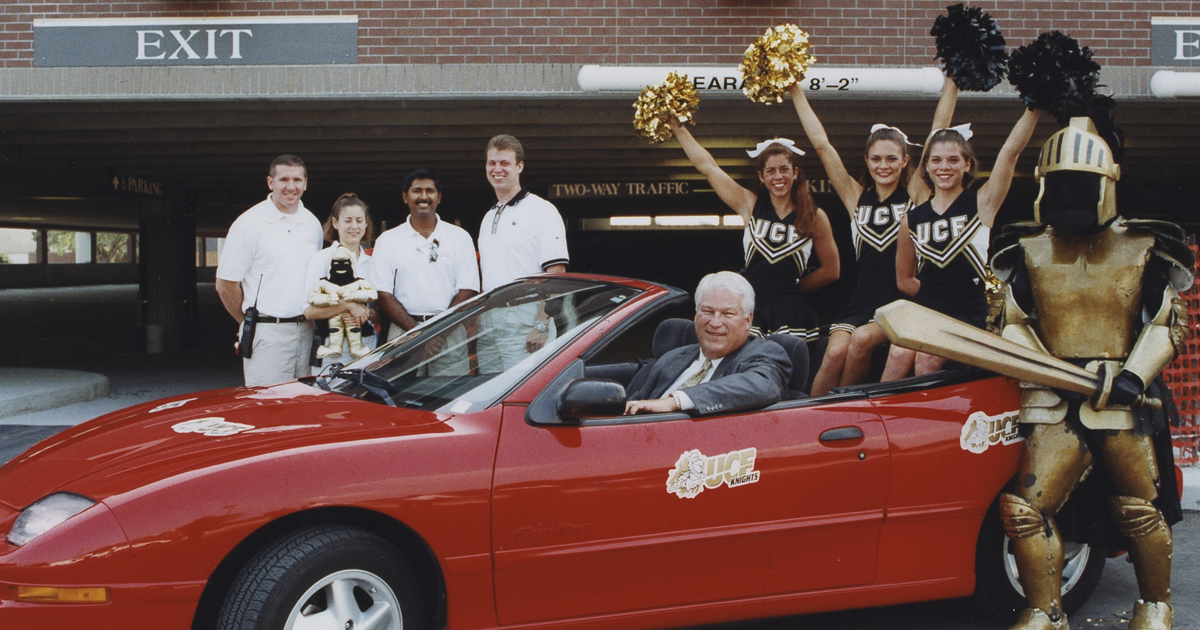
Dean: So, I’ve gotten tired throughout the years from hearing for such a long time that UCF is up and coming even though I thought that clearly, it had arrived. Can you pinpoint a time that you felt that UCF had finally arrived in your mind?
Dr. Hitt: There are a number of them because it’s a large, complex organization and there are different touch points. One that not many people would guess probably and it’s a one-off deal at this point, but we got our first Rhodes Scholar years back, Dr. Tyler Fisher who is now on the faculty here, spent his years in England and is back now. Being able to win, having an institution who had a student who won a Rhodes Scholarship, was a milestone reached and I got several notes from fellow Presidents around congratulating us on having a student who had earned a Rhodes Scholarship. Getting the medical school approved is another great example. For our sports fans, I would say that if you think about the Bowl game last January when our guys went out and beat Auburn, that really was a point where we arrived. A lot of the network folks now don’t refer to us as Central Florida, it’s UCF, which is what our folks had wanted to be referred to all along, but you don’t win it just by arguing with people. There’s a point where they have to acknowledge that and I think that win against Auburn in Atlanta really was a turning point for us. You can’t compel the respect that comes that way, you know it when you’ve got it.
I knew that we would get some shots taken at us …
Dean: You know, after going to the Fiesta Bowl, I thought that it was going to be really hard to get better than that and I could never have imagined in such a short time period, when we went up to Atlanta [for the Peach Bowl], that we could top that experience, but we did. It’s a different team, different time, and it felt different. And about that game, I wanted to ask I think you mentioned in the past how Danny White came up and mentioned about the National Championship. What was your first thought when he mentioned that he was thinking about [claiming] that?
Dr. Hitt: Well, I knew that we would get some shots taken at us, but it didn’t take long to say do it. [laughs]
Dean: Because you had to move fast on it, right?
Dr. Hitt: Yeah and you can’t construct moments like that. There are too many imponderables. You know what it will take in general terms at least, but you can’t really say well, we’re going to win by this score, it will be this kind of game. And gosh, I thought I’d never see the likes of the Fiesta Bowl again. I don’t know if Auburn had played that Baylor team who would have won. They were two very good teams, but I know it meant a whole lot more in our part of the country to beat Auburn than it would have to beat another Baylor or another team outside the SEC. But to beat one of the traditional powerhouses of the SEC meant a great deal and I’m just so proud of what Scott Frost and his team did and what Josh Heupel is now doing to continue the progress of the program. It would be hard anywhere to have two successive loss-free seasons, but we’ll see what Josh can do. I think he’ll have a very exciting team for us. We’re moving up to our home in Wisconsin when I step down here in a few weeks, but I’ve got to find a way to have some compelling business here that will bring me back for a couple of games anyway.
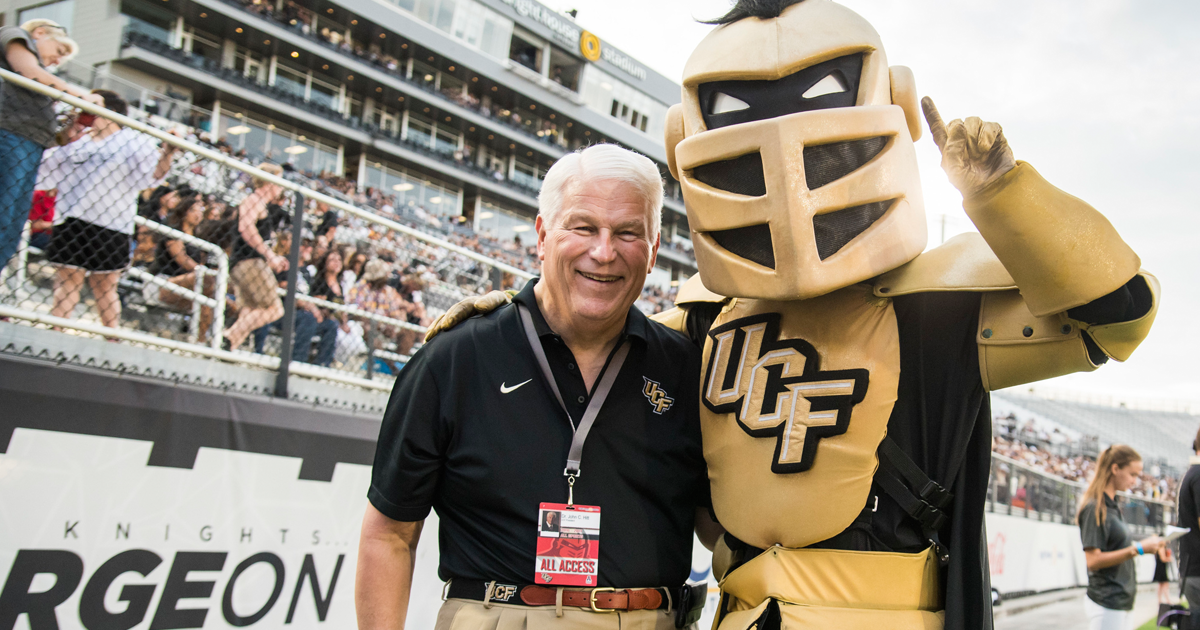
Dean: Well, my friends have a pretty good tailgate called the All Knighters and you are welcome to come anytime [for that compelling business].
Dr. Hitt: [laughs] Thanks, Dean.
Dean: So Dr. Hitt, I wanted to close out with a question that I like to ask my interviewees about kind of looking at themselves in third person. What would you say is your secret, if you could distill it down to the actual secret, that makes you outrageously remarkable?
Dr. Hitt: Well, I think that’s an interesting title and I’m not sure I would have applied it to myself, but one of the things that has helped me be successful over the years and a lot of folks might not think about it is if you have a good sense of what the opportunity is and you’re willing to focus on that, a really intense focus can sometimes make up for a lot of deficiencies. I think that’s one of the things that’s helped me be successful to the extent that I have; the willingness to focus in on something and stay with it. We did an exercise years back when I was at Texas Christian where we had to get one word that we associated with each of our colleagues and the word that won for me was determined. I still laugh about it, but one of the guys in the group had to speak up and he said, actually you weren’t determined, but that’s what your friends wanted us to say.
Dean: Dr. Hitt, I can’t wait to release this interview and read it a few times and reread all these nuggets. I really appreciate you doing this and I brought you a little something. I can’t say that I planned this totally, but on the way over here, I saw that the Seahawks picked up Brandon Marshall and he’s going to be playing with the Griffin brothers. My company makes this type of branded merchandise, so I made a one-of-a-kind hat for you a while back [while we were running an order] that I planned to give to you at some point, but it’s a UCF hat and you know what, that kind of looks like Seahawks gray trim there, so I wanted to give that to you.
Dr. Hitt: Well thank you. Thank you very much.
Dean: Thank you so much. I appreciate the time.
Dr. Hitt: My pleasure.
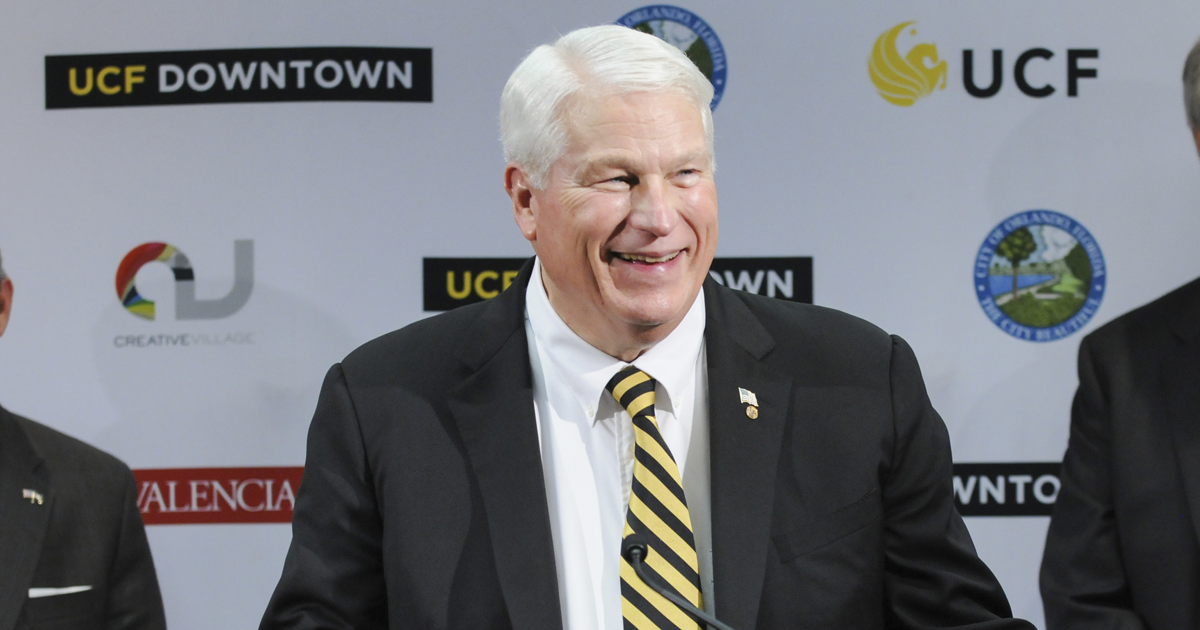
____________
Appreciate Chad & Courtney with UCF for helping me coordinate this interview. Interview pictures by Joshua Johnson -> Check out his photography work here. Thank you to Tori Walsh on my team at Blezoo for the infographic!
Want to keep up with Dean’s blog? Subscribe here to be an insider